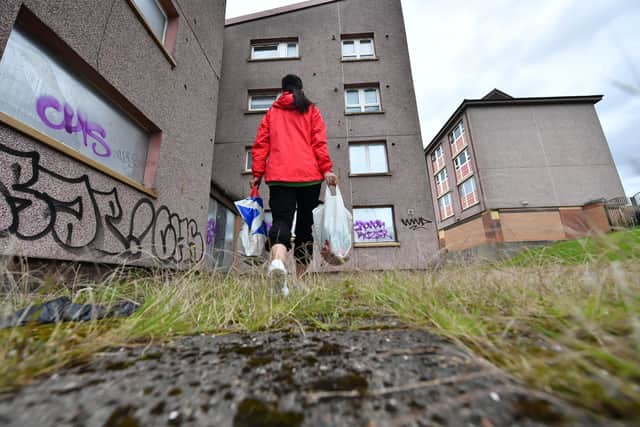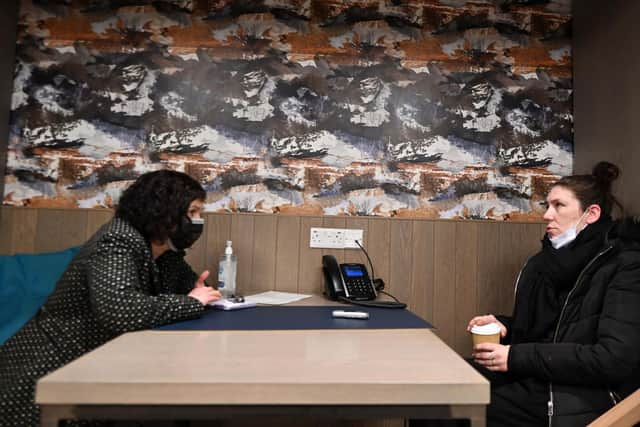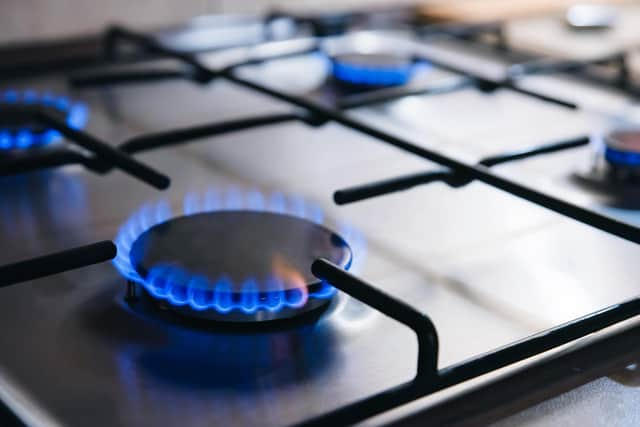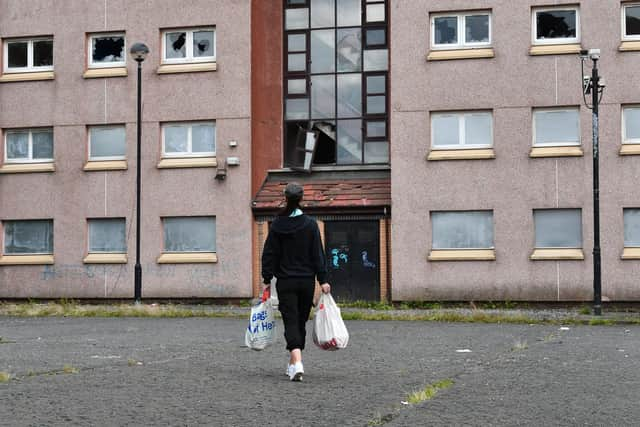Cost of living crisis: The reality of life for Scots on the breadline - Dani Garavelli
At the moment, she has no curtains, no bed, no white goods and no keycard to turn on the power. On these cold winter nights, she is lying in a sleeping bag on the floor. “I have to keep my jacket on,” she says. She is being supported by various charities and is looking forward to a time when the flat is homely and warm; but we are in the middle of a cost of living crisis and Caterisano knows it won’t be easy.
“It’s exciting, but it’s scary exciting,” she says. “I know the cost of energy and food is rising. I know I’ll have to budget. I’m quite good at budgeting but I’m not sure how I will get on.”
Advertisement
Hide AdAdvertisement
Hide AdCaterisano is speaking to me in the Simon Community’s Access Hub - an advice and support centre for those who are homeless or at risk of homelessness. In a booth at the other side of an airy room sits Neil McGarvie.


McGarvie moved from a hostel to a furnished flat in early November. He is filling out forms to try to secure a one-off crisis payment. The 48-year-old is on Universal Credit, which was cut by £20 a week shortly before he moved and is struggling to make ends meet.
McGarvie is jittery too, but with barely-contained panic. “I don’t get paid again until 1 March,” he says. “I am running out of electricity and food. For the last few weeks, I haven’t been thinking straight; I’ve just been trying to make it through the days.” At the hostel, meals were provided and gas and electricity were paid for. “I was looking forward to some independence, but I didn’t expect it to be this tough,” he says.
Head of services for Simon Community Scotland, Ashley Young, is scared too. Over the course of the pandemic, the number of rough sleepers and those housed in temporary accommodation has fallen. But she fears that with energy and food prices soaring some of those the organisation has helped will slip back into homelessness.
“For many people we support, this is their first tenancy,” she says. “It’s all pre-payment meters which is the most expensive way to buy power. When they go in there’s support in place, but that might last from six to 12 weeks and then it starts to pull back, so what we are starting to see is people who were newly into tenancies really starting to struggle to get by.”


There are ways in which the access hub staff can help; they may be able to arrange for money to be put in the meter, help service users liaise with the power companies or refer them onto the Wise Group’s Glasgow Home Energy Advice Team (G.Heat). But people are often embarrassed; they may not ask for help until they have already racked up large debts. “The fear is we will see some of them give up their keys and go back into homelessness because they can’t afford to be in their houses,” Young says.
Food is an issue, too. Some organisations which provided a hot breakfast during Covid have now stopped and it’s increasingly expensive to fill a supermarket shopping basket.
“We are definitely seeing an increase in people coming in and asking for food vouchers or access to a food bank,” Young says. “But the food parcels are smaller than they used to be because demand is so high and the food banks are stretched. And food has to be cooked, which requires more gas and electricity so people are more likely to fill themselves up on crisps and chocolate.”
Advertisement
Hide AdAdvertisement
Hide AdSome people have told her they leave their flats as soon as they wake up in the morning. They hang around the access hub longer than they need to, just to keep warm. Then, when they finally go home, they go straight to bed and huddle under their covers.


Young says it is not catastrophising to suggest lives could be lost. “Many of our service users already have chronic health conditions. You can see if they are in freezing flats with no carpets or curtains and their nutrition is poor, those conditions are going to get worse. That’s before you take into account the toll on their mental health.”
***************
The current crisis is the worst many of those working on the frontline in Scotland have encountered. The increase in global gas prices leading to a 54 per cent rise in the energy price cap means 18 million households will see their bill go up by £693 to £1,971 from April. For those on pre-payment systems, energy bills will rise by £708 to £2,017.
To understand how devastating this is, you have to set it in context. Not only does it come on the back of 10 years of austerity politics, punitive welfare reforms and a two-year pandemic, but it coincides with increases in the price of petrol, food, national insurance and council tax. The cost of living is said to be at a 30-year high.


Scotland already has high levels of deprivation. One in four children are living in poverty, 68 per cent of them in households where someone works. With inflation rising faster than wages, and expected to exceed 7 per cent by April, those households will be placed under further pressure.
Those who are out of work are suffering too. The return of Universal Credit to pre-pandemic levels has seen income cut by around £1,000 a year, but benefits are not keeping pace with inflation either. Their annual increase, which begins in April, was set in September when inflation stood at just 3.1 per cent which means an estimated further real-term decrease of £500 a year.
Then, of course, there are asylum seekers and those with no recourse to public funds who were already falling through the cracks.
“The biggest hit from the energy price rise is for single people because they are covering the bill themselves,” says Chris Birt, associate director for Scotland at the Joseph Rowntree Foundation. “We calculated that people on low benefits whose bills were going up by £500 to £600 would be left with just £4 a day after housing costs were covered. If you have just £4 a day and you get ill, how do you even get to the doctor’s?
Advertisement
Hide AdAdvertisement
Hide Ad“We are in such a bad position now that when we talk about poverty we are no longer talking about not being able to realise your full potential and to participate in society, which should be everyone’s experience; we are talking about basics like hunger and cold. We have spiralling levels of destitution where people can’t keep a roof over their head.”
Andrew Anderson, from Fife, is a single father to his five-year-old daughter Mia. He is immunocompromised, and so had to shield at the height of Covid.
“I used to pay £70 a month in energy bills and they tried to put it up to more than £300 a month which is 90 per cent of my Universal Credit,” he says. “If I had to pay that I would have nothing left to live off so I had to come to an agreement with the provider that I could pay less, but it’s still double what I was paying before.
“A normal shop for me and my girl used to cost £20-£30 a week, it’s close to £70 now.” Mia is also growing fast. By the end of last term, she had grown out of her school uniform, but Anderson had no money. “It was only because I got a charity voucher that I could buy her a new one,” he says.
“Every day you are penny pinching and trying to find a cheaper way of doing things. I am cutting back on eating. Maybe I won’t have lunch so I can feed the little one.
“It’s a vicious circle. I have had help from food banks but you can only go there so many times. We’re stuck in the house because we can’t afford to go and do things but being in the house means we use more gas and electricity, so I can’t win.”
Anderson is on the parents’ forum of Fife Gingerbread, which supports 350 to 400 single parent families a year.
The charity set up an annual Eat and Heat Appeal aimed at ensuring children from low income households enjoyed a Christmas equal to their peers. But soon they found they were receiving requests for financial support throughout the year. The number of requests has risen dramatically over the last 12 months from seven in January 2021 to 23 in January 2022.
Advertisement
Hide AdAdvertisement
Hide Ad“That speaks volumes about the growing impact on families and the choices they are having to make,“ says the charity’s strategic manager Laura Millar. “The stress and the mental health impact is something we are very conscious of too. It filters down to children. They are aware their mum or dad is struggling and they stop asking for things.”
Millar worries that the focus on the immediate crisis means the potential long-term implications are being overlooked.
“Quite rightly, a lot of the narrative around this just now is about food and fuel: people making choices between eating and heating their homes. But they are also making choices between buying good healthy food or crappy cheaper food for their freezers so there’s a long-term health implication.
“I also worry we are forgetting that, if parents are having to choose between food and fuel, there are other things they are going without, such as age-appropriate toys for their children. Some people think those things are frivolous, but it’s about children’s life chances, so I’d say they were a necessity.”
Millar says one mother told her the cut to Universal Credit meant she could no longer send her daughter to an out-of-school club which had improved her confidence. “Those clubs are vital for children and their development, their equity to their peers and their ability to overcome the attainment gap.”
In an attempt to tackle these problems, the Scottish Government introduced its child payment for low income families with children under the age of six. This payment will double from £10 per child per week to £20 per child per week in April and is to be extended to families with children under the age of 16 by the end of the year. The government has also introduced bridging payments to help those with children aged between six and 16 until the roll-out is complete.
First Minister Nicola Sturgeon hailed the move as “the boldest and most ambitious poverty measure anywhere in the UK”. But despite the good intentions, some fear the extra money, which was intended to improve people’s lives, will do little more than offset the damage wrought by the rising cost of living.
“ I don’t think [she] realises what that’s going to go towards. It’s going to go towards people’s heating bills,” Anderson says.
Advertisement
Hide AdAdvertisement
Hide Ad“We know parents are going to extraordinary lengths to protect their children, going without food themselves just to make sure there’s food on the table for their family, but it’s becoming more and more difficult and there’s more to come,” adds John Dickie, director of the Child Poverty Action Group in Scotland.
“The Scottish child payment is already providing very real additional support to families with children under six. The value of that support shouldn’t be under-estimated. The commitment to double that payment will bring significant relief to those families. Our concern is that the doubling and the roll-out to all children under 16 is due by December, but that’s still a while away.
“Without these payments things would be considerably worse, but all the price rises mean they are not so much improving people’s lives, they’re just making a contribution to helping them keep afloat in the current crisis.”
*************
The UK government’s answer to the rise in heating bills has been to give £150 to all households in the A-D council tax band - a move widely criticised as not sufficiently targeted at the hardest hit.
The chancellor, Rishi Sunak, also gave the Scottish Government £290m to distribute as it saw fit. While conceding it has limited levers at its disposal, some anti-poverty campaigners had hoped the SNP would choose a different mechanism. The Scottish Government had already given councils an extra £120m to try to avoid inflation-busting rises in the wake of the end of the Council Tax freeze. But earlier this month Finance Secretary Kate Forbes announced that - like Sunak - she would also be giving £150 to all households in bands A-D.
Some believe this move was political. With council elections only a few months away, Sunak doubtless liked the idea of being able to take credit for reducing millions of Council Tax bills. But there are local elections in Scotland too. Was it easier for the Scottish Government to defend not targeting the money more effectively than to defend people in Scotland not receiving £150 that their English counterparts were being given?
Birt believes the Scottish Government missed an opportunity to do things better. “The Fraser of Allander Institute said maybe this was the best way of getting the money into people’s hands quickly, and that there were trade-offs involved, but for me those trade-offs went too far,” he says. “They have given people £150, but energy bills are going up by £600, food prices have gone up, benefits have been cut. By spreading the £290m this thin, the Scottish government has made it less impactful. It’s not wasted. It’s not sitting in a bank, but it’s not touching the sides of the massive hole in lower income people’s budgets.”
Birt says the Scottish Government would have been better to put some of the money into Council Tax reduction which is targeted at those with the lowest incomes and some into the child payment bridging payment. “I think then they would have helped a decent number of people but they would have been able to give out £350 rather than £150 and there would have been £30m left over for the kind of catch-all scheme it has already identified [It set up a £10m emergency fuel fund through which local authorities can make discretionary payments].”
Advertisement
Hide AdAdvertisement
Hide AdWhile governments try to work out how to distribute extra cash, high-profile figures have been taking matters into their own hands. Just as Marcus Rashford pushed the UK government on free school meals so food campaigner Jack Monroe has been highlighting how the consumer price index (CPI) and the retail price index (RPI) underestimate the cost of living crisis. She also discovered Smart Price, Basics and Value ranges were vanishing from supermarkets, leaving consumers with no choice but to “level up” to supermarket own brands. As a result of her campaign, Asda reintroduced its Smart Price range.
Meanwhile, financial campaigner Martin Lewis took issue with Sunak’s plan for a separate compulsory £200 rebate off energy bills to be paid back £40 a year over five years. Lewis said the chancellor was taking “a worrying gamble with people’s finances”. Sunak was following the market’s view that energy prices would start falling later this year, meaning the cap would fall in April 2023. If correct, the rebate would lead to lower bills now while, in the future, the £40 would be covered by the drop in price. “But that is far from certain,” Lewis said, “especially with the escalating conflict between Russia and the Ukraine. And crucially, if rates don’t drop, or don’t drop a lot, people will be left in a lose-lose situation with far higher bills than now and an additional levy on top.”
**************
Charities are continuing to fight to keep people afloat; but their resources are stretched by higher demand and the same economic forces as the people they support. Young says she has calculated the energy bill for all the Simon Community Scotland buildings will increase by £40-£50,000. “That’s the equivalent of two members of staff,” she says.
And poverty in Scotland runs much deeper than this current crisis. Earlier this month, a report showed healthy life expectancy had fallen for the fourth successive year for women and the third successive year for men. The healthy life expectancy gap between people in the richest and most deprived areas now stands at 24 years.
Birt believes politicians must be bolder - for example by looking at more progressive taxation - and that the public are more receptive to this than leaders believe. “Poverty is not going to end through osmosis,” he says. “We know trickle down economics just doesn’t trickle down.”
In the meantime, life for many continues to be a daily struggle. “It doesn’t feel like living,” Anderson says. “We’re just existing.”